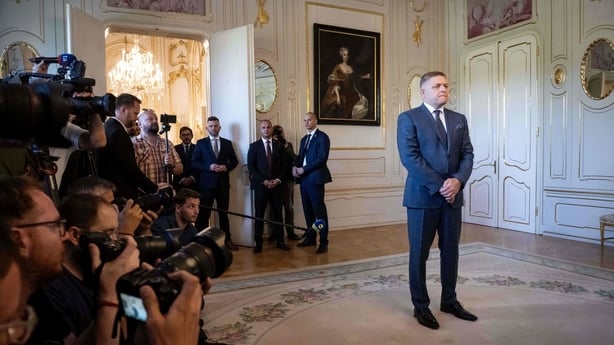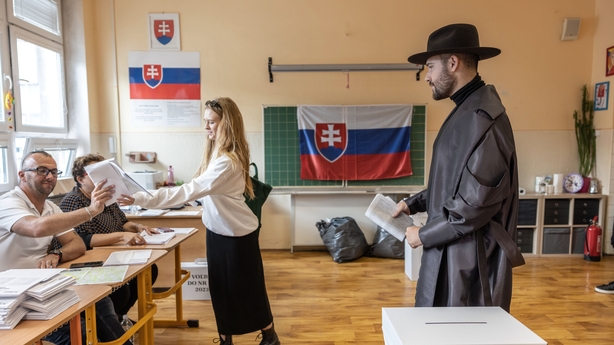Talks at forming a coalition government continue in Slovakia after populist party SMER, led by former prime minister Robert Fico, won the largest number of seats in last weekend's election.
Mr Fico was given until 16 October to form a government by Slovakia’s President Zuzana Caputova, which also happens to be one day after elections in neighbouring Poland.
The election was a polarised race between SMER and the liberal Progressive Slovakia party, with Mr Fico's party winning 42 of the country’s 150 parliamentary seats.
SMER's most likely coalition partners are social democrats HLAS (Voice), which won 27 seats and the pro-Kremlin Slovakia National Party, on ten seats.
That would give a SMER-led coalition 79 seats and a thin four-seat majority.
If Mr Fico fails to form a government, Progressive Slovakia will then be given two weeks to negotiate a coalition.
Progressive Slovakia would lead a broader pro-Western coalition of four parties, including HLAS and the country's Christian Democrats (KDH).
But that option also looks flimsy.
Progressive Slovakia and the Christian Democrats are diametrically opposed on social issues such as a same-sex marriage.
The potential combinations make HLAS, led by Peter Pellegrini, the kingmaker of the election.
Mr Pellegrini, a former SMER politician and prime minister, established HLAS in 2020 in a split from SMER.
He presented HLAS as a moderate voice in Slovakia's deeply polarised political landscape and, unlike SMER, has avoided embracing populism.
"I think the phenomenon of the election is the success of Peter Pellegrini," Milan Nic, a former advisor to Slovakia’s ministry of foreign affairs, told RTÉ News.
"There are three or four coalition options and the common denominator is the third largest party, Pellegrini's HLAS. He's a very strong kingmaker and therefore, I think the minimum price he will ask will be a premiership for himself."
A government led by Mr Pellegrini would not signal a reset of Slovakia's foreign policy.

In contrast, a Mr Fico-led government would provide Hungary’s populist Prime Minister Viktor Orban with a strong ally at European Council level on issues involving EU immigration policy and the war in Ukraine.
Like Mr Orban, Mr Fico is opposed, rhetorically at least, to EU sanctions against Russia.
During the campaign, Mr Fico pledged to stop supplying weaponry to Ukraine in the event that SMER forms the next government.
Mr Fico has also aped Kremlin propaganda, claiming that the war in Ukraine was started by Ukrainian fascists in 2014.
That sort of rhetoric has earned him the label of being pro-Russian and threatens to get SMER kicked out of the Party of European Socialists.
Though opposed to Ukraine joining NATO, Mr Fico's party supports Slovakia’s membership of NATO.
He has also said that Slovakia would continue to supply Ukraine with humanitarian aid.
"Fico was using this narrative of Ukraine in order to get votes and to pursue his own domestic agenda," said Mr Nic, senior research fellow at the German Council for Foreign Relations.
"He's a domestic agenda politician, not a foreign policy type of guy."
On the campaign trail, it was not Ukraine, but a cost-of-living crisis and high inflation that dominated the debate.
SMER performed better than polls had predicted, gaining seats at the expense of the far-right Republika party, which failed to make the 5% threshold to enter parliament.

Mr Fico was prime minister previously from 2006 to 2010, and again from 2012 to 2018.
He resigned in 2018 after the murder of Slovak investigative journalist Jan Kuciak and his fiancée Martina Kusnirova.
Mr Kuciak had been investigating high-level fraud involving Slovakian businesses.
In Mr Kuciak’s final report, published by Aktuality.sk after his murder, he claimed that a number of Slovakian nationals connected to SMER were linked to the 'Ndrangheta', an organised crime group from southern Italy.
The deaths of Mr Kuciak and Ms Kusnirova led to mass anti-corruption protests and the subsequent collapse of Mr Fico's government.
Support for the SMER party dropped below 10% at the time.
Mr Fico's political comeback owes much to his and his party’s opposition to immigration and socially conservative agenda, popular among older voters in small towns and rural areas.
His criticism of a previous government's response to Covid-19 also helped SMER regain supporters.
Juraj Marusiak, a political scientist at the Slovak Academy of Sciences, told RTÉ News that a coalition between SMER and Mr Pellegrini’s HLAS would be "difficult to create".
There is currently a split in opinion within HLAS over whether to go into government with SMER, said Mr Marusiak.
"A majority wants to establish a coalition with SMER, and Pellegrini is in the minority," he said.
Mr Pellegrini may be trying to wait out the current negotiations until he and his party are offered the chance to form a government.
Slovakia has had four minority and caretaker governments in the past five years.
It is a crucial few weeks for politics in Central and Eastern Europe.
In just over one week, Poles will vote in their parliamentary election.
A victory for Poland’s ruling Law and Justice party, along with a Mr Fico-led government in Slovakia and Mr Orban’s Fidesz party in Hungary, would result in a trio of nationalist-populist governments in the region.







